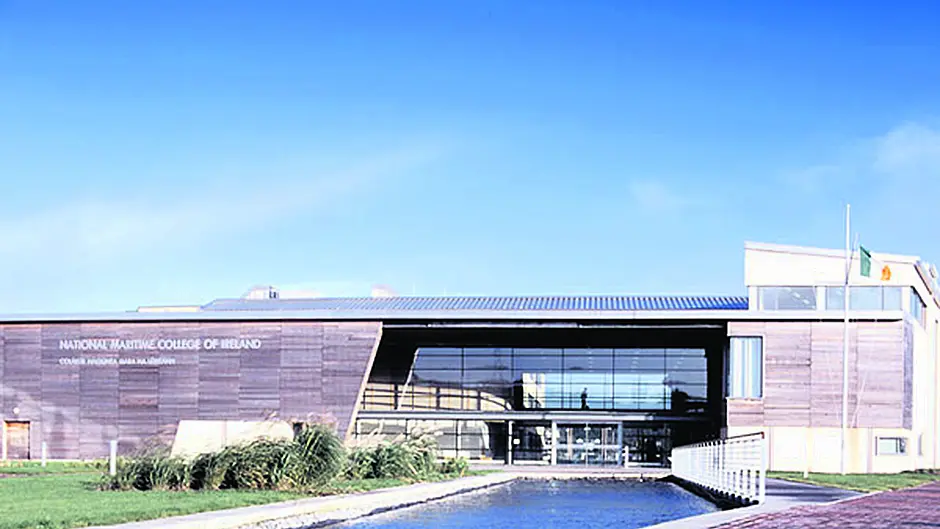Siobhan Cronin visits the NMCI campus in Ringaskiddy, celebrating 13 years of providing impressive facilities and top-quality courses for a broad spectrum of students pursuing a career on the water
TUCKED away in a quiet corner of Ringaskiddy, on ten coastal acres close to Pfizer and the Haulbowline naval base, is an impressive college campus with up to 700 students during its busiest times.
The National Maritime College of Ireland (NMCI) has been in operation since 2004 and is now a €70m high-tech training facility, with students coming direct from school, or through industry.
The NMCI is the first third level college in the country to be built under the Government’s Public-Private Partnership scheme. The public partners are the Cork Institute of Technology (CIT) and the Irish Naval Service (INS) and the private partner is Focus Education.
It is one of Ireland’s greatest educational success stories but, appropriately, goes somewhat ‘under the radar’ when compared with other household-name colleges.
Yet up to 3,000 students graduate from here every year, qualified for a hugely broad variety of careers, including in the navy, in academia, in the fishing and oil industries, as skippers, ships’ pilots, deck hands, marine engneers, chefs, and even superyacht crew.
In the commercial division of NMCI Services there are over 80 courses between a number of industry partners. The academic side also has the Marine Electrotechnology degree, Nautical Science & Marine Engineering degrees, along with officer of the watch (deck), chief mate/master, second engineer officer and chief engineer officer for professional seafarers.
The college has its genesis in CIT’s marine-related courses which grew to such an extent throughout the 90s and early noughties, that a new campus was required.
That campus became Ringaskiddy and the rest is maritime history.
Ideally located close to the Irish navy’s headquarters, and on the edge of the Port of Cork, the NMCI has garnered a huge international reputation for the quality of its courses and lecturers.
Drawing staff from both academia and the industry, the impressive campus boasts state-of-the-art facilities which surpass many other rival colleges abroad.
There are navigation simulators which mirror real-life ships’ bridges; engineering simulators with full mission engine rooms; a marine communications suite for radio engineers, and a sea survival pool for safety and recovery training.
With container ships and oil tankers representing a large section of global sea traffic, there is big demand for the college’s extensive programme targeting merchant shipping.
Jetty facilities are impressive – a 25-person free-fall enclosed lifeboat for safety training is complemented by two 36-person lifeboats used in offshore exploration, and a 20m pontoon alongside a slipway with winch facilities.
There is even a separate area for training students how to cope with fires at sea, or in enclosed spaces, and a unit that simulates flooding on board a ship. The college is sometimes used for corporate ‘team building’ days, too, as colleagues learn to rely on each other under pressure.
College trainees are also shown how to repair a ship after flood or fire damage, and how to find their way out of foamy or smoky areas when they become disorientated.
Courses are full-length academic terms, or shorter refreshers or updating courses for industry personnel.
There are also workshops for welding, electrical and electronics, and mechanical engineering and trainees can even learn the workings of a sewage treatment plant and garbage disposal.
‘There are also many courses that are now mandatory for the industry,’ explained Joy Gillen, the marketing executive at the college. ‘There are basically four elements to the college – research, commercial, academic and the navy.’
It’s the perfect location for the nearby navy to come and go, whether for full-time courses or for safety or sea survival refresher courses.
But proximity to the busy Port of Cork also means that many graduates can aspire to working closer to home.
With the fishing industry becoming increasingly regulated, the college has a strong representation from fishing fleets in the likes of Castletownbere, Union Hall and a host of other busy ports.
‘We had the Dublin Fire Brigade in last week,’ Joy pointed out, ‘they were doing survival techniques.’
Joy was happy to give the Star a tour of the sea survival pool, showing us the full ‘environment’ in action – complete with strong waves, wind and thunder and lightning effects. There is a replica of a helicopter – manufactured in Carrigaline by SafeTec – that can be submerged in the rough waters and tipped over so the trainees are taught how to cope in such a high stress situation.
‘They are taught how to manage being disorientated and how to get out of the situation without panicking,’ said Joy, who added she has experienced the effect a few times herself. ‘The water is colder than a standard pool, but warmer than the sea, and the instructors are amazing, they are so calm in any situation and you feel totally safe.’
The pool has also been used by many film crews who use it to simulate rough water scenes, including a crew from the BBC who used it for a Comic Relief sketch.
It is an environment that is invaluable to Coast Guard and RNLI members who regular use the facility for training. Before the NMCI was in Cork, they had to do their training in Blackpool in the UK.
‘We have a lot of ex-navy instructors here and a lot of people with a background in the merchant navy too,’ Joy said.
‘There are training centres all over the world, but we find that people love coming here because of the facilities and also the friendliness of the Irish staff, and also, they often take trips over to Spike Island and into the city while they are here,’ she added.
The freefall lifeboat at the jetty is a great selling-point for the college as most large shipping containers and tankers use these lifeboats but most ships’ crew have never seen one in action before embarking on their offshore careers. It means they can train in safety and will know exactly what to expect, should the worst ever happen at sea.
The college itself is also an impressive and modern building.
The foyer is a spectacular large glass space opening onto the generous-sized café and overlooking an ornamental pond, out to the sea beyond.
There is an extensive library, a gym and basketball court, and the curved ‘chart room’ at the top of the building has stunning views across to Cobh.
Not bad for a little-known college, albeit at the cutting edge of maritime education.








